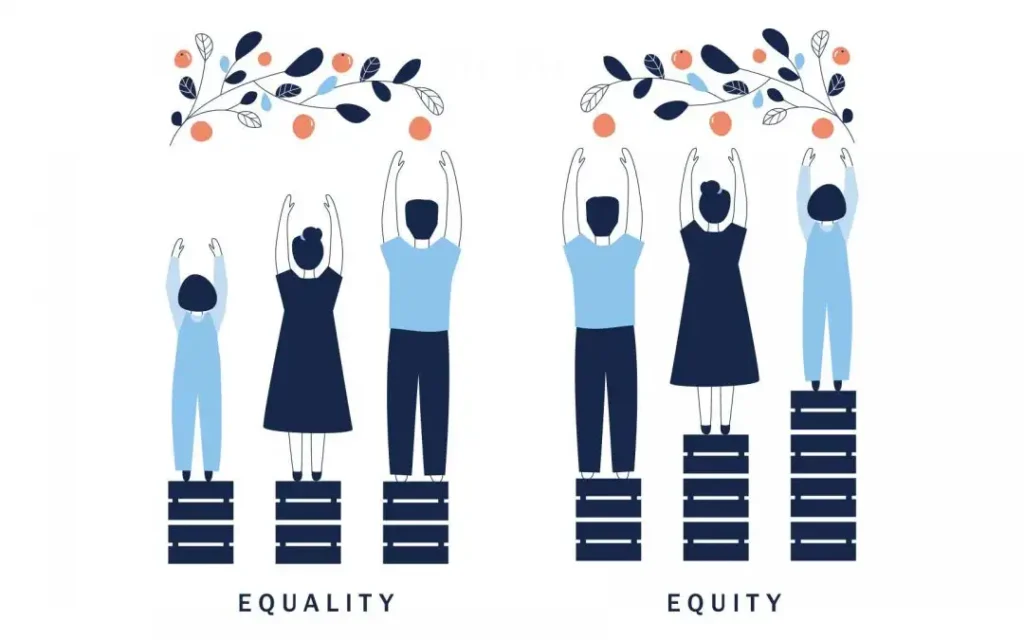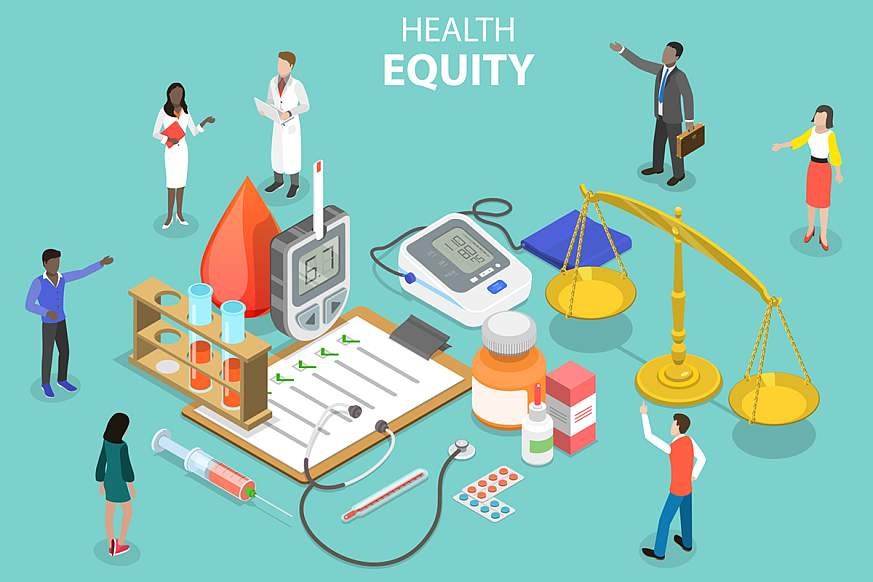Health Equity: A Fair Shot at Being Healthy
In an ideal world, everyone would have an equal opportunity to live a healthy life, but that’s not always the case. The concept of “health equity” focuses on making this ideal a reality, aiming to ensure that everyone, regardless of who they are or where they come from, has the same chance at good health.
Let’s dive into what health equity is, why it’s important, the barriers to achieving it, and what can be done to close the gap.

What Exactly is Health Equity?
Health equity is about fairness in healthcare. It’s different from “equality,” which simply means giving everyone the same resources or services. Equity, on the other hand, recognizes that people have different needs and backgrounds and might require tailored support. For instance, while one community might need more clinics, another might need better transportation to access healthcare facilities.
The World Health Organization (WHO) defines health equity as the absence of unfair, avoidable, or remediable differences among groups of people. Achieving it means that every person, no matter where they live, their income level, or their race, can attain their highest level of health.
Why is Health Equity Important?
Health equity isn’t just a healthcare issue; it’s also a social justice issue. When certain groups face barriers to good health, it impacts everyone. Poor health outcomes can lead to lower productivity, higher healthcare costs, and a greater burden on social services. Beyond that, it’s simply the right thing to do: no one should suffer because they lack access to the care or resources they need.
When people have equal opportunities for good health, communities become stronger and more resilient. Health equity helps to create a society where people have the same chances to succeed and thrive, regardless of their circumstances.

Barriers to Health Equity
Unfortunately, there are a lot of barriers to achieving health equity. Here are some of the main obstacles:
1. Income and Poverty
People living in poverty often have a harder time accessing healthcare. They may not have insurance, struggle to pay for prescriptions, or even lack money for nutritious food, which can contribute to poor health. Additionally, people in lower-income neighborhoods might live in areas with fewer healthcare facilities, making it harder to get the help they need.
2. Education and Health Literacy
Health literacy, or the ability to understand health information, plays a huge role in health outcomes. People with limited education may not understand how to manage their health conditions or may be unaware of preventive measures. This lack of understanding can lead to chronic issues that might have been preventable with better knowledge.
3. Geographical Location
For many people in rural or remote areas, healthcare facilities can be miles away, and public transportation might be scarce. These geographic challenges make it harder to get regular check-ups, leading to poorer health outcomes over time.
4. Racism and Discrimination
Racism and discrimination continue to be huge barriers in healthcare. Certain racial or ethnic groups may face biases from healthcare providers, impacting the quality of care they receive. This can discourage people from seeking medical help, leading to worsened health issues.
5. Language and Cultural Barriers
When healthcare providers don’t speak the same language or understand the cultural background of their patients, communication can suffer. Misunderstandings and lack of cultural sensitivity can lead to lower-quality care, making it harder for patients to feel comfortable and understood.
6. Mental Health Stigma
Mental health often gets sidelined in discussions about healthcare, even though it’s equally important. Stigma around mental health, particularly in certain cultures or communities, can prevent people from seeking help. Additionally, mental health services are often underfunded or harder to access, especially in underserved areas.
Steps Toward Health Equity
The good news is that there are steps we can take to move toward health equity. It’s a challenging task, but many organizations, governments, and communities are already working to make healthcare more accessible and fair. Here are some effective strategies:
1. Investing in Underserved Communities
Governments and organizations can invest in health infrastructure, such as clinics, hospitals, and mental health services, in communities that lack access. By bringing healthcare closer to people, we can help ensure that everyone has nearby, affordable access to services.
2. Expanding Health Education
Improving health literacy through community programs, schools, and online resources can empower people to take control of their health. When people know how to prevent disease and manage chronic conditions, they have a better chance of leading healthier lives.
3. Promoting Cultural Competency in Healthcare
Training healthcare providers to understand and respect cultural differences can greatly improve patient care. Simple steps, like hiring translators or offering culturally sensitive resources, can make a big difference in making healthcare feel more inclusive.
4. Addressing Social Determinants of Health
Social determinants like housing, food security, and employment play a huge role in health. Programs that address these issues—like affordable housing initiatives, food assistance programs, and job training—can reduce the health disparities that stem from poverty.
5. Combating Racism in Healthcare
Addressing systemic racism in healthcare is crucial. This involves raising awareness of biases, holding healthcare institutions accountable, and making it easier for marginalized groups to report discrimination without fear.
6. Expanding Health Insurance Coverage
Without health insurance, many people simply can’t afford care. Expanding affordable health insurance options, as well as making existing options more accessible, would help close the coverage gap, especially for low-income and minority groups.
How Can Individuals Support Health Equity?
You don’t have to be a policymaker or a healthcare provider to help make healthcare fairer. Here are some simple ways that anyone can contribute to health equity:
- Raise Awareness: Talking openly about health disparities can help bring attention to the issue and encourage change.
- Support Local Organizations: Many community organizations work to improve health access. Supporting or volunteering with these groups can make a real difference.
- Educate Yourself and Others: Learn about health equity and share your knowledge. Understanding the issue is the first step to changing it.
- Advocate for Policy Changes: Support policies that aim to close healthcare gaps, such as expanded health insurance coverage or anti-discrimination measures.
Some Trustable Companies
Here’s a sample data table with information about some fictional healthcare companies that focus on health equity, including their ratings, primary services, and locations.
| Company Name | Rating | Primary Services | Location | Description |
|---|---|---|---|---|
| HealthFirst | 4.7/5 | Affordable primary and preventive care | New York, NY | A nonprofit organization providing low-cost clinics and mobile healthcare units in underserved neighborhoods. |
| EquityCare | 4.5/5 | Telemedicine and health education services | Austin, TX | Focuses on expanding telemedicine to rural areas with limited access to healthcare. |
| Wellness for All | 4.8/5 | Mental health counseling and wellness programs | Los Angeles, CA | Provides affordable mental health services and wellness programs, especially for underserved communities. |
| Community Health Access | 4.6/5 | Insurance enrollment assistance, screenings | Chicago, IL | Specializes in helping low-income individuals access healthcare benefits and preventive screenings. |
| MedEquity | 4.4/5 | Affordable diagnostics and lab testing | Atlanta, GA | Offers low-cost diagnostics, lab testing, and screening for uninsured populations. |
| AccessHealth | 4.9/5 | Culturally tailored health programs | Miami, FL | Provides multilingual health services and educational programs tailored to immigrant communities. |
| InclusiveMed | 4.5/5 | Chronic disease management and education | Detroit, MI | Aims to reduce chronic disease disparities in low-income neighborhoods through education and management programs. |
Frequently Asked Questions (FAQs)
1. What does “health equity” mean?
Health equity is the principle of ensuring everyone has fair access to healthcare services and the resources they need to be healthy. Unlike health equality, which treats everyone the same, health equity acknowledges that some communities need extra support due to social and economic factors.
2. Why are companies focusing on health equity?
Companies focusing on health equity aim to address the healthcare disparities that exist between different social, racial, and economic groups. By doing so, they help to create healthier communities, reduce long-term healthcare costs, and support social justice.
3. How do I know if a healthcare provider supports health equity?
You can look for providers who offer sliding scale fees, support community health initiatives, provide language and cultural services, and have a commitment to serving underserved communities. Many organizations focused on health equity will also mention it in their mission statements.
4. Can telemedicine help with health equity?
Yes, telemedicine is a powerful tool for advancing health equity, especially in rural or underserved areas where access to healthcare is limited. It allows patients to connect with providers without the need for travel, which can reduce barriers to care.
5. How can I support health equity initiatives?
You can support health equity by donating to or volunteering with organizations that promote healthcare access, advocating for policy changes, raising awareness, and educating yourself and others about the importance of health equity.
6. Are health equity companies nonprofit or for-profit?
Companies focused on health equity can be either. Many are nonprofits since their missions align with serving the community. However, there are also for-profit healthcare providers that are committed to health equity principles and serve under-resourced communities.
7. Does insurance cover health equity services?
It depends on the service and the insurance provider. Many health equity-focused companies offer services at reduced costs or provide support for those who are uninsured, but some services, like telemedicine, may be covered by insurance. It’s always best to check with the individual provider and your insurance plan.
The Bottom Line
Health equity is all about making sure everyone has a fair chance at a healthy life. Achieving it will require collaboration from all parts of society, including governments, communities, and individuals. The journey won’t be easy, but with greater awareness and action, we can create a future where healthcare is fair, accessible, and tailored to everyone’s needs.
Ultimately, working toward health equity is a commitment to fairness and humanity. It’s about giving everyone—not just a few—a fair shot at a healthy, fulfilling life.
For Any Questions And Querry Comment or Contact us
How To Gain Weight Fast?
While it’s tempting to load up on junk food, it’s essential to focus on healthy weight gain. This means building muscle, not just fat. Here’s how:
1. Increase Your Calorie Intake
Aim for about 300–500 more calories than your body burns daily. This might seem like a lot, but small changes in your diet can…readmore